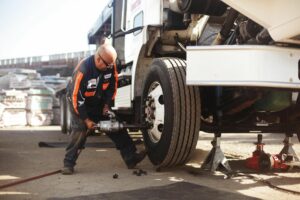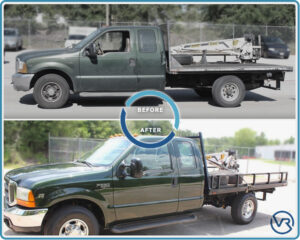Originally posted by Tom Quimby for Overdrive
Search through pickup forums on the topic of new vehicle deliveries and it’s not uncommon to read about supply chain issues forcing customers to wait three, four, five months or even longer to get their trucks.
And it’s not just long wait times, it’s also ongoing price hikes on dealers’ lots that make buying new trucks even more of a headache.
To get around delivery delays and historic inflation, a Colorado construction company is opting to have their trucks rebuilt a few states away in Texas.
Scott Tabickman, who manages equipment, facilities and projects at Doud BTS in Golden, Colorado, is more than happy to make the 1,000-mile trip to Vehicle Reman in Austin to have Doud’s pickups remanufactured given the quick turnaround and money they can save versus buying new trucks.
“I’ve run several vehicles through them and really love the whole concept,” Tabickman said. “You give them something that’s worn out, they whip the body off it, replace the powertrain, replace all the systems and upgrades and give you back a new truck, up to and including body work.”
ne of Doud’s more recent rebuilt trucks, a 2006 Ford F-250, had been sitting for “probably four years in Wyoming,” Tabickman explained, when he loaded the truck up on a trailer and made the trip to Austin.
“They probably had it for four-and-half weeks,” he said. “I got basically a brand-new truck including the interior. They rebuilt it and it was extremely reasonable.”
Tabickman said he saved about 30 to 40 percent going through Vehicle Reman versus buying new. He opted for VR’s Level III rebuild which includes a rebuilt powertrain, mechanical and electrical work, body work and paint, interior refurb, basically “the whole kitchen sink,” according to VR’s chief revenue officer Joe Gonzales.
“With level three, we add in some wow gifts too,” Gonzales continued. “If the vehicle doesn’t have a backup camera, we throw it in there. We add improved cargo lighting, Bluetooth, just things we’ve asked drivers that would make their job easier.”
A Level 1 rebuild includes installing a remanufactured powertrain and doing other work necessary to get the vehicle “functional and on the road as quick as possible,” Gonzales said. Level 2 includes everything in Level 1 plus “a few bells and whistles on it, like making sure the interior’s clean. If it needs headliners, seat cushions, sun visors, things like that.”
About 90 percent of customers opt for a Level III rebuild which VR applies to Class 1 – Class 6 trucks, vans and shuttle buses. Vehicles roll out with a three-year, 100,000-mile warranty and meet the manufacturer’s latest design changes.
“If you’ve got an AC compressor on a truck that’s been out five or six or ten years, there’s a good chance that it’s been upgraded and redesigned a bit to correct common faults,” said Vehicle Reman CEO Jonathan Carr. “So you’re getting all of the latest updates on everything.”
That also includes addressing variable valve timing, or VVT, in Ford’s 5.4-liter engines.
“If you’re not completely on top of maintenance, you can get lack of lubrication and VVT camshaft problems and you’ll have to replace your engine,” Gonzales said. “Those engines are now remanufactured with the VVT delete where that issue will no longer exist.”
The transformation of the vehicles often leaves customers speechless according to VR president and founder Greig Latham.
“Trucks wear out gradually and slowly. You don’t realize how loose it is, how loud it is, how much performance you’ve lost and then when you jump back into the thing [following a VR rebuild], it’s a multisensory awakening. It’s really something to behold,” Latham said.
In addition to saving time and money, Latham said customers lessen their environmental impact by having a vehicle remanufactured versus buying new. According to VR’s website, they use about 25% of the energy and “produce only a 20% of the greenhouse gas emissions and 14% of the toxic air pollution that typically results from car production.”
Gonzales said it’s possible to get “carbon credits for doing reman because all of the materials you save that don’t go to the landfill.”
Growing business fuels single moms charity
The workflow has been growing at VR where they’re looking at expanding in Austin and beyond with an all-encompassing approach to vocational training and certification in vehicle remanufacturing.
“We’re combining what we would call traditional automotive repair with automotive production. We’re not thinking small on this,” said Gonzales who led VR’s relocation from Tyler this year to Austin where they set up shop in about 30 days.
That’s good news for Tabickman who’s hoping to see VR make the move to Colorado.
“I’d love to have something here,” he said. “They should franchise this.”
Carr said they’re seeking to do just that as they look at areas with enough fleet activity to support expansion. The Dallas-Fort Worth area and Houston are currently up for consideration.
In the meantime at their Austin location, Gonzales said they’re happy to “work with a transport broker to get the best rates for our customers [for transporting vehicles to VR].” Following a rebuild, fleets have flown out employees to drive their vehicles back.
Increasing revenue at Vehicle Reman is also helping them to expand their mission of helping single moms with car repair through thehubgarage.org. More than 800 vehicles owned by single mothers have been repaired through Christian Brothers Automotive at an average cost of $1,890 each.
“That’s one of our big missions, to help single moms,” Carr said.


